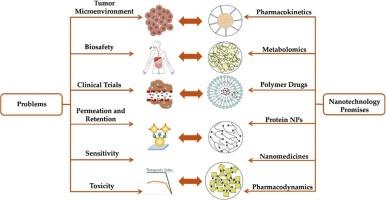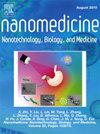肿瘤纳米医学:诊断突破和治疗前沿。
IF 4.6
2区 医学
Q2 MEDICINE, RESEARCH & EXPERIMENTAL
Nanomedicine : nanotechnology, biology, and medicine
Pub Date : 2025-08-29
DOI:10.1016/j.nano.2025.102854
引用次数: 0
摘要
纳米医学是一个多学科领域,为癌症的检测和治疗提供了重要的前景。纳米粒子(NPs)、纳米探针和纳米生物传感器可以通过对比成像技术实现高灵敏度的肿瘤检测。定向药物递送癌症治疗的应用可以通过药物负载纳米载体的配方和剪裁来实现。NPs被用作载体,通过主动或被动的机制将药物或生物分子输送到肿瘤组织,从而提高治疗效果,减少有害影响。然而,纳米医学翻译一直受到TME渗透性和滞留性增强和ICI的阻碍,限制了患者的改善和潜在结果。TME由癌细胞、CAFs或TAFs、特异性免疫细胞和基质组成,在促进癌症对纳米治疗的耐药性方面起着至关重要的作用。本文综述了纳米技术在癌症诊断和治疗中的应用,探讨了纳米医学在癌症中的病理生理特点、机制和局限性。本文章由计算机程序翻译,如有差异,请以英文原文为准。

Nanomedicine in oncology: Diagnostic breakthroughs and therapeutic Frontiers
Nanomedicine is a multidisciplinary field, offering significant promises for cancer detection and therapy. Nanoparticles (NPs), nanoprobes and nanobiosensors can be tailored to achieve highly sensitive tumor detection by contrast imaging techniques. The application of directed drug delivery for cancer therapies can be achieved via the formulation and tailoring of drug-loaded nanocarriers. NPs have been employed as carrier to transport drugs or biological molecules to tumor tissues via active or passive mechanisms, consequently improving treatment outcomes and minimize harmful effects. However, nanomedicine translation has been hindered by augmented permeability and retention and ICI of the TME, limiting improvement and potential outcomes of patients. TME, consisting of cancerous cells, CAFs or TAFs, specific immune cells, and the stroma, performs a crucial part in contributing to cancer resistance to nanotherapy. This review summarizes nanotechnology application in the identification and treatment of cancers by exploring pathophysiological features, mechanisms and limitation of nanomedicine in cancer.
求助全文
通过发布文献求助,成功后即可免费获取论文全文。
去求助
来源期刊
CiteScore
11.10
自引率
0.00%
发文量
133
审稿时长
42 days
期刊介绍:
The mission of Nanomedicine: Nanotechnology, Biology, and Medicine (Nanomedicine: NBM) is to promote the emerging interdisciplinary field of nanomedicine.
Nanomedicine: NBM is an international, peer-reviewed journal presenting novel, significant, and interdisciplinary theoretical and experimental results related to nanoscience and nanotechnology in the life and health sciences. Content includes basic, translational, and clinical research addressing diagnosis, treatment, monitoring, prediction, and prevention of diseases.

 求助内容:
求助内容: 应助结果提醒方式:
应助结果提醒方式:


